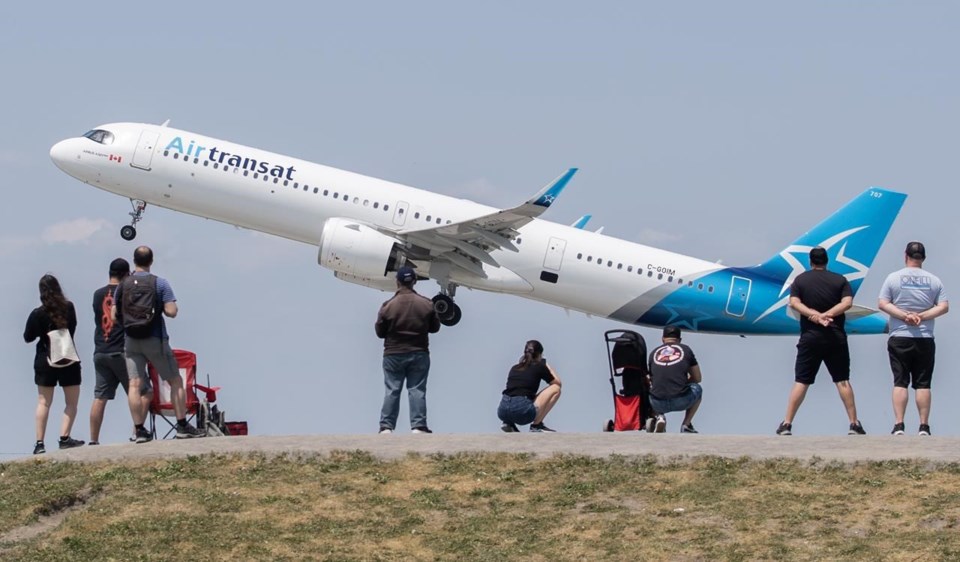MONTREAL — Canadians are still gung-ho for travel to sun-splashed resorts and European getaways, in spite of higher inflation and interest rates, says Transat AT Inc. chief executive Annick Guérard.
"We're pretty much confident about the fact that the Canadian airline sector continues to benefit from pent-up demand," Guérard told investors on a conference call to discuss the company's latest financial results.
Transat reported Thursday its highest net income ever for a third quarter and turned a profit for the first time since 2019, prompting a brighter financial forecast for the year.
Healthy demand for leisure travel boosted revenue per passenger by 29 per cent compared with four years earlier, an indication of fare hikes on trans-Atlantic routes. The price tag on round-trip flights by Canadian airlines to Europe this fall rose 22 per cent from 2019 levels, according to online travel agency Hopper Inc.
To meet the sustained demand, Transat plans to expand capacity by nearly a quarter in 2024, increasing its fleet to 40 planes come winter, versus 35 a year earlier. The push comes as other Canadian carriers also ramp up flight volume, particularly on sun-bound routes, setting the stage for heightened competition.
"With what we see today, despite inflation, we're pretty much comfortable that that's the right capacity to deploy to make sure that we position ourselves well in the market," Guérard said.
Demand remains especially strong for premium travel — "five-star, 4.5-star packages" — she added. The trend builds on the CEO's comment in June that Canadians aged 55 and over, many of whom remain insulated from mortgage rate hikes and enjoy "significant disposable wealth and the time to travel and spend," have resumed their pre-pandemic travel habits.
"Early bookings are ahead of last year which, combined with firm pricing, bode well for the start of the new fiscal year," Guérard said.
As a result, Transat raised its margin target on adjusted earnings for 2023 to between 7.5 and eight per cent from a previous outlook of 5.5 to seven per cent, its second guidance bump this year.
The Montreal-based tour package company also said revenue in the three months ended July 31 rose nearly seven per cent above 2019 levels, despite capacity sitting 14 per cent below — another hint of higher prices and packed planes.
"In other parts of the world folks just buy the cheapest ticket and bugger off for a week and then worry about finding a decent place to stay," said Robert Kokonis, president of consulting firm AirTrav Inc.
"In Canada — to quote a former CEO of Swoop — Canadians are hooked to package vacations like a drug."
Nonetheless, Transat closed the sale of a piece of land in Mexico's Yucatán Peninsula to resort company Finest Resorts last month as it positions itself as an airline above all else, rather than simply a tour package provider.
Transat owns "close to zero" hotel units, though it still sells a range of vacation packages and maintains a 50 per cent stake in one hotel complex, chief financial officer Patrick Bui said in a phone interview.
"Prior to the pandemic, we wanted to be an integrated tour operator — so have the hotels, the aircraft and everything related to that. But our new strategic plan is focused on being an efficient airline. Full stop," Bui said.
Transat hopes to divest its stake in the joint venture resort, he added.
The company used the $50-million proceeds from the land deal to reduce its debt, which stands at $2 billion, or about $1.4 billion in net debt, following a financially devastating pandemic period.
"Prior to the pandemic, we wanted to be an integrated tour operator — so have the hotels, the aircraft and everything related to that. But our new strategic plan is focused on being an efficient airline. Full stop," Bui said.
Transat hopes to divest its stake in the joint venture resort, he added.
On Thursday, the company reported net income of $57.3 million in its third quarter — its highest quarterly profit since late 2017 — versus a loss of $106.5 million a year earlierÂ
Revenue rose 47 per cent to $746.3 million from $508.3 in the same three months last year.
On an adjusted basis, Transat said it earned $1.10 per share in its most recent quarter, up from an adjusted loss of $3.20 per share the year before.
The average analyst estimate had been for an adjusted loss of nine cents per share, according to estimates compiled by financial markets data firm Refinitiv.
This report by The Canadian Press was first published Sept. 14, 2023.
Companies in this story: (TSX:TRZ)
Christopher Reynolds, The Canadian Press



